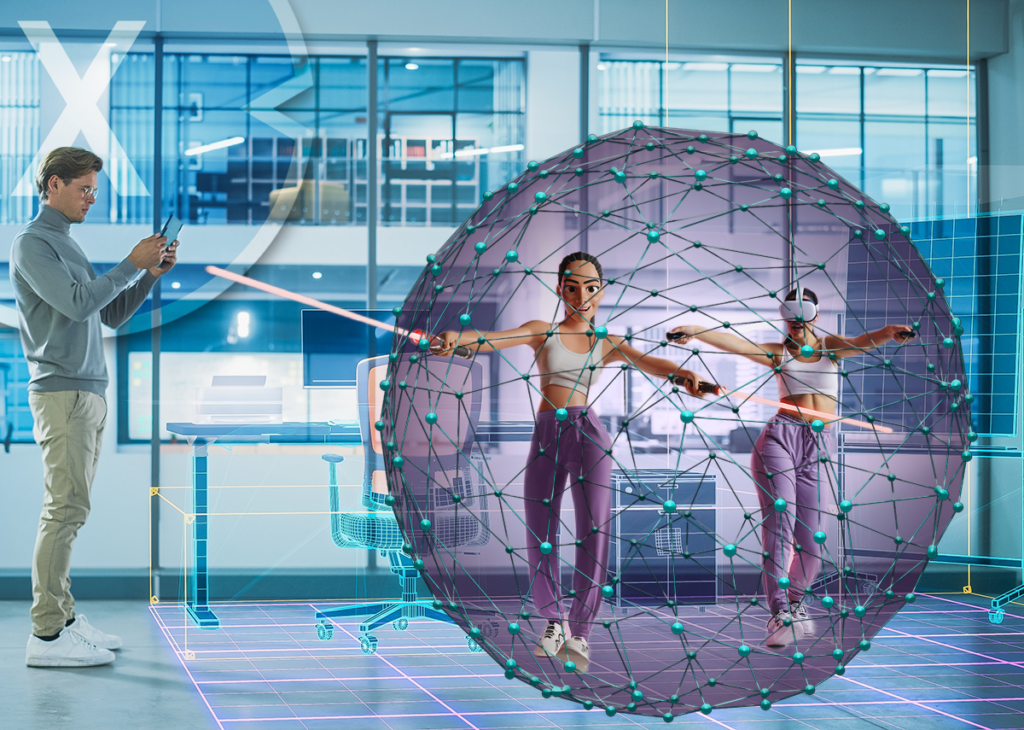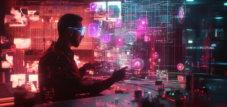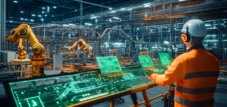Face to face with the present future: How augmented reality and AI will transform the global technology market
Xpert pre-release
Language selection 📢
Published on: November 3, 2025 / Updated on: November 3, 2025 – Author: Konrad Wolfenstein

Eye to eye with the present future: How augmented reality and AI will transform the global technology market – Image: Xpert.Digital
Is the smartphone on the brink? Why the return of augmented reality is shaking up the power structure of the digital world.
The coming paradigm shift between digital everyday presence and industry-driven innovation
The race for the next generation of digital devices is on, and with the announced market readiness of smart glasses—whether pure AR, AI, or hybrid AI-AR glasses—the discussion has reached an unprecedented level of intensity. In the shadow of a waning virtual reality hype, augmented reality (AR) is emerging as a user-centric key technology whose volume and societal impact are likely to significantly shape the global economy over the next decade. While consumer interest in immersive worlds has declined considerably after the Connect and Metaverse bubbles, industrial AR use cases have been flourishing for years, driven by production digitization, digital twins, and sustainable integration projects along the lines of Industry 4.0. The convergence of these two worlds is imminent: industry experts, companies, and institutional investors alike are watching as the technological and societal prerequisites for an AR renaissance, particularly in the consumer sector, are coming to fruition.
At the same time, this increases uncertainty surrounding established market structures. The more concretely new ecosystems emerge, the louder the voices become that consider a fundamental disruption of the globally dominant smartphone market possible. This analysis outlines the economic state, historical development paths, key drivers, current data, and the status quo, illustrated by international case studies. It assesses risks and conflicting objectives as well as future paths – and discusses the market-related implications for companies, policymakers, and investors. The analysis concludes with a systematic reassessment: What strategic levers are driving this change, and how far will this upheaval extend for markets and society?
Development paths and milestones: From vision to mainstream technology
Today's situation is the result of a complex history. The first attempts to augment real-world experiences with digital information date back to the 20th century. In the 1960s, "The Sword of Damocles" was the first head-mounted display – too heavy and impractical for everyday use. In the 1990s, Boeing coined the term "augmented reality" for the first time in the context of industrial maintenance, while barcode and GPS integration opened up new possibilities for logistics and navigation. Increasingly powerful smartphone components helped AR glasses – most notably Google Glass – achieve global prominence in the 2010s. However, a lack of computing power, high costs, and, above all, serious data privacy concerns led to the failure of these devices to achieve mainstream adoption.
Only with the digitization and networking of industrial production did AR applications gain traction: Digital twins, networked sensors, and cloud and edge infrastructures formed the foundation for an ever-expanding range of industrial use cases. In parallel, global technology companies – Meta (Facebook), Snap, Apple, Google, Microsoft, and TCL – invested billions in developing and preparing their own hardware and software platforms for smart glasses. The game-changer of today: artificial intelligence, more affordable components, more powerful networks (5G/6G), miniaturized displays, and the breaking down of social acceptance barriers in a digitally networked world. This strengthens the conditions for their parallel establishment in the consumer market – as the next stage after the smartphone.
Analysis of key factors: drivers, stakeholder landscape and market mechanisms
The current dynamics of AR and AI glasses are based on the interplay between industrial pioneers and global platform companies. Key players include leading US technology companies (Meta with Ray-Ban, Apple with Vision Pro, Google with Android XR, Snap with Spectacles), specialists from Asia (XREAL/Nreal, Rokid, RayNeo/TCL, Xiaomi), and a multitude of specialized hardware and AI suppliers (Qualcomm, Sony, Samsung). Within the industrial metaverse, companies such as Siemens, Nvidia, Kuka, Schneider Electric, Foxconn, Intel, and Nokia play a crucial role.
The most important drivers:
- Rapid performance improvements in miniaturization, battery technologies and display innovation reduce costs and increase convenience.
- The close strategic partnerships between traditional optics manufacturers (Luxottica/Ray-Ban, Oakley) and tech companies are bringing fashionable, everyday designs to the market.
- AI integration creates new applications: real-time translation, visual search, contextual navigation, product and people recognition, AR-enabled entertainment and shopping.
- 5G/6G networks and powerful cloud infrastructures enable high-performance real-time applications and a seamless user experience.
- Industrial pioneers are driving penetration with digital twins, remote maintenance, simulation-based optimizations and sensor integration, which is paving the way for a spillover of functions and innovations into the consumer sector.
Market mechanisms are multi-layered. On the one hand, closed ecosystems of hardware and software are emerging, resulting in high switching costs (analogous to the smartphone and app model). On the other hand, providers are vying for open standards to leverage network effects early on. The race for platform dominance and interface control is intensifying, particularly between Meta (Facebook), Apple, Google, and a growing number of Asian challengers.
🗒️ Xpert.Digital: A pioneer in the field of extended and augmented reality
Where to invest? Who shapes the AR market? Opportunities and risks in the AR ecosystem

Where to invest? Who shapes the AR market? Opportunities and risks in the AR ecosystem – Image: Xpert.Digital
Status Quo: Quantitative Indicators and Key Challenges
The global market is developing rapidly and with rapidly increasing volumes. According to Statista and Bitkom, the global market for AR hardware (B2C) will generate approximately €7.8 billion in revenue in 2025, with sales of AR and VR hardware alone rising to over €20 billion by 2030, representing an annual growth rate of 21 percent. By 2025, more than three percent of those surveyed in Germany will have tried actual AR glasses; around a quarter of all consumers can imagine using AR glasses, and this figure rises to more than a third among those under 50. The user base is expected to grow to more than 160 million worldwide by 2030. In the industrial context, the majority of manufacturing managers are already using digital twins, with documented efficiency gains and demonstrable reductions in operating costs.
The biggest challenges lie in the lack of everyday usability, particularly regarding battery life, weight, and design; the price (currently mostly $300–$1500); the robustness of industrial use cases; and the unresolved issues of consumer acceptance and data privacy. Skepticism stems primarily from unconscious filming, constant connectivity, and data privacy concerns—issues that, as with smartphones, are likely to lessen only through a societal learning curve. Furthermore, there is widespread ignorance about the actual potential applications: only about half the population even knows that the everyday smartphone is AR-capable, and many still associate the technology solely with gaming, although productivity and everyday scenarios could offer the greatest potential.
Case studies: International comparative perspective
USA: The platform duopoly of Meta and Apple
Meta dominates with the Ray-Ban Meta ( market share >60% in the consumer segment ) and sold over two million units in 2024. Apple Vision Pro remains in the premium price segment and focuses primarily on enterprise applications, but is one of the most important drivers of innovation. Both companies rely on a combination of AR functionality, fashion, and AI integration. Meta is also investing heavily in digital ecosystems for everyday use – from navigation to music and visual search.
China: XREAL and fragmented market leadership
XREAL (formerly Nreal) leads the local consumer AR market with approximately 22–45% (depending on the source), ahead of RayNeo (TCL), Rokid, and other companies. Innovative functionalities, low prices, and local network effects are driving this growth; Chinese providers benefit from high levels of technology trust and government support. At the same time, the Chinese enterprise market is highly dynamic: Digital twins are replacing traditional automation, and manufacturers like XREAL are entering international markets through aggressive pricing and innovation strategies. The Chinese market development demonstrates how standardized platforms are prevailing over isolated solutions and how local adaptation is crucial for market breakthroughs.
Europe/Germany: Industrial penetration and slow acceptance
In Germany, industrial use is well advanced – 48% of manufacturing companies will be using digital twins by 2024 , with demonstrable increases in efficiency and product quality. In the consumer sector, however, acceptance is clearly below the international average: While 26% of the population can imagine using AR glasses, skepticism regarding data privacy remains prevalent. Local providers and startups like Gixel are complementing the market, and open-source initiatives are attempting to reduce dependence on US and Asian platforms.
Risks and Controversies: Multi-perspective Assessment
The resurgence of AR harbors significant economic, social, and environmental risks and conflicting objectives. On the one hand, closed ecosystems (Meta, Apple) threaten monopolization; on the other, data privacy concerns and the constant recording of personal environments create new forms of surveillance. Experts debate whether AR glasses will replace or merely complement the existing smartphone dominance—and what regulatory measures are necessary to ensure data sovereignty and social acceptance. Environmental factors—resource consumption of rare raw materials, energy consumption of the device fleet, short innovation cycles, and the associated electronic waste—are also gaining importance in the regulatory debate.
The social component should not be underestimated: acceptance problems, employment issues in the context of industrial change, overwhelm and digital fatigue, as well as distribution issues regarding access and skills are among the unresolved conflicts. Some see AR as the next big technology bubble, while others advocate for socially integrated and barrier-free mainstream adoption.
Future scenarios: Development paths and disruptions
From an analytical perspective, three main scenarios can be distinguished:
Scenario 1: Gradual substitution and coexistence
AR/AI glasses complement smartphones but do not completely replace them. They are gaining widespread acceptance early on, particularly for certain use cases (navigation, industry, logistics, social communication), and are being continuously improved. Smartphones remain central for text and media consumption as well as for apps.
Scenario 2: Disruptive Substitution
Technological leaps – for example in design/comfort or battery/connectivity – are enabling true everyday glasses that will actually replace smartphones for a large portion of users. Leading platform companies are establishing themselves as the new gatekeepers for digital interaction, and the app economy is transforming into a device-centric ecosystem around AR applications.
Scenario 3: Market fragmentation and setback
Uncertainties regarding data privacy, slow progress in everyday usability, and high costs are delaying adoption; the parallel operation of many platforms is creating isolated solutions instead of a dominant ecosystem. Some consumers are sticking with smartphones, while the industrial sector is developing independent solutions.
In all scenarios, regulatory measures, addressing societal fears, and promoting innovation are critical to success. Markets and society must jointly establish guidelines for data protection, openness, sustainability, and social justice.
AR glasses represent the next turning point in digitalization — those who occupy the interfaces early on shape markets, standards, and everyday interaction.
The resurgence of augmented reality marks a technological and societal turning point, whose strategic implications could potentially surpass even the smartphone boom of the last decade. Crucial to the success of this renaissance are advances in everyday usability, pricing, technical integration, and, not least, societal acceptance.
Business leaders must select ecosystem partners early on, build innovation programs and expertise, and develop targeted adoption strategies tailored to each market stage. For investors, this presents opportunities to gain early exposure to platform technologies and hardware innovators, albeit with significant uncertainty regarding future market leaders. Policymakers are called upon to promote open standards and data sovereignty, strengthen European alternatives, and create the conditions for the sustainable scaling of the hardware business and the software economy.
The topic remains ambivalent: AR glasses embody the next step in digitalization – and will determine how and by whom interaction, communication, and everyday experiences will be controlled and shaped in the future. History shows that those who occupy the interfaces of the digital world early on can shape markets and set standards. The AR renaissance has begun – with an uncertain outcome, but enormous potential.
Your global marketing and business development partner
☑️ Our business language is English or German
☑️ NEW: Correspondence in your national language!
I would be happy to serve you and my team as a personal advisor.
You can contact me by filling out the contact form or simply call me on +49 89 89 674 804 (Munich) . My email address is: wolfenstein ∂ xpert.digital
I'm looking forward to our joint project.
☑️ SME support in strategy, consulting, planning and implementation
☑️ Creation or realignment of the digital strategy and digitalization
☑️ Expansion and optimization of international sales processes
☑️ Global & Digital B2B trading platforms
☑️ Pioneer Business Development / Marketing / PR / Trade Fairs
Our global industry and economic expertise in business development, sales and marketing

Our global industry and business expertise in business development, sales and marketing - Image: Xpert.Digital
Industry focus: B2B, digitalization (from AI to XR), mechanical engineering, logistics, renewable energies and industry
More about it here:
A topic hub with insights and expertise:
- Knowledge platform on the global and regional economy, innovation and industry-specific trends
- Collection of analyses, impulses and background information from our focus areas
- A place for expertise and information on current developments in business and technology
- Topic hub for companies that want to learn about markets, digitalization and industry innovations
🎯🎯🎯 Benefit from Xpert.Digital's extensive, five-fold expertise in a comprehensive service package | BD, R&D, XR, PR & Digital Visibility Optimization

Benefit from Xpert.Digital's extensive, fivefold expertise in a comprehensive service package | R&D, XR, PR & Digital Visibility Optimization - Image: Xpert.Digital
Xpert.Digital has in-depth knowledge of various industries. This allows us to develop tailor-made strategies that are tailored precisely to the requirements and challenges of your specific market segment. By continually analyzing market trends and following industry developments, we can act with foresight and offer innovative solutions. Through the combination of experience and knowledge, we generate added value and give our customers a decisive competitive advantage.
More about it here:





















